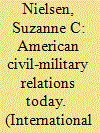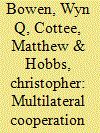|
|
|
Sort Order |
|
|
|
Items / Page
|
|
|
|
|
|
|
| Srl | Item |
| 1 |
ID:
111918


|
|
|
|
|
| Publication |
2012.
|
| Summary/Abstract |
Fifty-five years after it was first published, Samuel Huntington's The soldier and the state remains an essential starting point for serious discussions of American civil-military relations. In part this is due to the boldness and ambition of the author. Huntington brought theory to a research area that had suffered from too little theorizing and then went on to formulate concepts that scholars and practitioners of civil-military relations still find useful. These include: the conceptualization of the military as a profession; the articulation of the two central forces shaping the nature of military institutions as the functional and the societal imperatives; and the formulation of subjective and objective control as the two main patterns of civilian control. This review article briefly revisits these concepts and argues that they retain utility in illuminating important issues in American civil-military relations today. It also argues, however, that Huntington's contributions were productive but not perfect. Some of his specific definitions, such as the content of military expertise, are debatable. Some of his central concerns, such as whether the United States could sustain a strong military over an extended period of time, are no longer central today. Finally, in some places the literature has moved beyond what Huntington offered. The best example is the ongoing debate over how the country's political leaders and its most senior military officers should interact. It is precisely on this point that Huntington's objective control is the weakest. While The soldier and the state certainly does not deserve uncritical acceptance, it does continue to merit a fair hearing. Current discussions of American civil-military relations are likely to be more reasonable and productive if Huntington is given a voice.
|
|
|
|
|
|
|
|
|
|
|
|
|
|
|
|
| 2 |
ID:
111912


|
|
|
|
|
| Publication |
2012.
|
| Summary/Abstract |
Drawing primarily on the experience of the UK since 2001, this article examines the increasing prevalence of risk as an organizing concept for western defence and security planning and its implications for civil-military relations and strategy-making. It argues that there may be tensions between such approaches and the principles of good strategy-making, which aim to link means and resources to ends in a coherent manner. Not only does risk potentially blur the relationship between means and ends in the strategy-making process, it also exposes it to contestation, with multiple interpretations of what the risks actually are and the strategic priority (and commitment) which should be attached to them. The article examines these tensions at three levels of risk contestation for British defence: institutions, operations and military-society relations. In the case of the UK, it contends that the logic of risk has not been able to provide the same national motivation and sense of strategic purpose as the logic of threat. In this context, calls for a reinvigoration of traditional strategy-making or a renewed conception of national interest may be missing a more fundamental dissonance between defence policy, civil-military relations and the wider security context. More widely, the strategic ennui that some western states have been accused of may not simply be a product of somehow falling out of the habit of strategy-making or an absence of 'political will'. Instead, it may reflect deeper social and geostrategic trends which constrain and complicate the use of military force and obscure its utility in the public imagination.
|
|
|
|
|
|
|
|
|
|
|
|
|
|
|
|
| 3 |
ID:
111913


|
|
|
|
|
| Publication |
2012.
|
| Summary/Abstract |
Although the law has always been a major reference point in the conduct of war, little scholarly attention has focused on the transformative effect of recent legal challenges, judicial rulings and inquiries on the armed forces themselves, notably the 2011 Gage Inquiry into the death of Baha Mousa and the Philip Inquiry into the Mull of Kintyre helicopter disaster. Despite this, the impact has been significant in the ways it has transformed the governance regime of British armed forces and the professional autonomy of the military. This article conceptualizes the impact of law on the armed forces as 'juridification'. In applying this concept, this article analyses the implications of this for the culture, conduct and organization of the British armed forces. It argues that juridification closes a civil-military relations gap between society on the one hand and the armed forces on the other. As important, juridification also brings with it permanent instability because of the inevitable conflicts that arise from the replacement of an old order based on authority, to a new military system based on rights. Thus the effects of juridification are not just a liminal moment-a transitory dislocation from established structures and the reversal of existing hierarchies-followed by the creation of a permanent new order. Rather, juridification has initiated an era of instability that is characterized by the absence of any permanent settlement of authority and rights in the governance of the armed forces. This has significant implications for the armed forces and their professional autonomy and the social, political and legal context in which armed forces have to operate.
|
|
|
|
|
|
|
|
|
|
|
|
|
|
|
|
| 4 |
ID:
111919


|
|
|
|
|
| Summary/Abstract |
The Responsibility to Protect doctrine (R2P), now ten years old, has been widely accepted at the international level. As the books under review demonstrate, debates around its legitimacy are over. Instead, we see a developing second generation of literature focusing on how the R2P needs to be understood more concretely in both academic and policy terms, as well as how it affects the linked issues of humanitarian intervention and state-building. Within this literature, we see new and important questions emerging. These include how and when we should intervene and whether we can be successful at it; how we can assist states to ensure they fulfill their own responsibilities towards their populations; and where international authority lies. Unfortunately, the answers to these questions are hard ones. Implementation, and how it reflects embedded culture at the international level, may be as hard-if not harder-as introducing the doctrine originally.
|
|
|
|
|
|
|
|
|
|
|
|
|
|
|
|
| 5 |
ID:
111910


|
|
|
|
|
| Publication |
2012.
|
| Summary/Abstract |
Political and media attention in the UK is devoted to three interrelated aspects of defence: policy, the management of defence resources and military operations. This article argues that the 1998 Strategic Defence Review placed excessive reliance on anticipated improvements in the management of defence resources to render Labour's defence policies affordable. The field of attempted defence management improvements is surveyed and it is concluded that no final answers were generated on the key issues of the division of tasks among uniformed personnel, civil servants and the private sector, or on whether defence should be run largely on a capability basis or on single service lines. Given the demonstrated similarity between the government's concepts of the UK's role in the world in the Strategic Defence Review (1998) and the Strategic Defence and Security Review (SDSR) (2010), there is a clear danger that the SDSR also relies too much on efficiency savings. By reference to the inherent complications of defence management and to three strands of management thought (complexity management, wicked problems and principal-agent theory), the article argues that some inefficiency will always be present. It suggests that the Clausewitzian concept of friction, accepted as pertinent to the area of military operations, might also be applied to efforts to generate military capability. It concludes that defence reviews should not be based on assumptions about efficiency savings and that students of international security and defence need to pay attention to both the volume of resources going into defence and the mechanisms by which they are managed.
|
|
|
|
|
|
|
|
|
|
|
|
|
|
|
|
| 6 |
ID:
111911


|
|
|
|
|
| Publication |
2012.
|
| Summary/Abstract |
Military doctrine is one of the conceptual components of war. Its raison d'être is that of a force multiplier. It enables a smaller force to take on and defeat a larger force in battle. This article's departure point is the aphorism of Sir Julian Corbett, who described doctrine as 'the soul of warfare'. The second dimension to creating a force multiplier effect is forging doctrine with an appropriate command philosophy.
The challenge for commanders is how, in unique circumstances, to formulate, disseminate and apply an appropriate doctrine and combine it with a relevant command philosophy. This can only be achieved by policy-makers and senior commanders successfully answering the Clausewitzian question: what kind of conflict are they involved in? Once an answer has been provided, a synthesis of these two factors can be developed and applied.
Doctrine has implications for all three levels of war. Tactically, doctrine does two things: first, it helps to create a tempo of operations; second, it develops a transitory quality that will produce operational effect, and ultimately facilitate the pursuit of strategic objectives. Its function is to provide both training and instruction. At the operational level instruction and understanding are critical functions. Third, at the strategic level it provides understanding and direction. Using John Gooch's six components of doctrine, it will be argued that there is a lacunae in the theory of doctrine as these components can manifest themselves in very different ways at the three levels of war. They can in turn affect the transitory quality of tactical operations. Doctrine is pivotal to success in war. Without doctrine and the appropriate command philosophy military operations cannot be successfully concluded against an active and determined foe.
|
|
|
|
|
|
|
|
|
|
|
|
|
|
|
|
| 7 |
ID:
111917


|
|
|
|
|
| Publication |
2012.
|
| Summary/Abstract |
The second Nuclear Security Summit on 26-27 March 2012 in Seoul provides an important opportunity to gauge international consensus on the threat posed by nuclear terrorism, and to evaluate progress in the development of multilateral cooperative efforts to prevent it. However, the 'nuclear security' agenda has long been complicated by the complexity of the issues it covers and diverging perceptions of the risks and threats in this area. Further complications involve the politics that have constrained the development of formal cooperative approaches and the patchwork nature of the existing multilateral policy architecture. While the Summit is unlikely to go very far in mitigating these complications, it will nonetheless provide impetus to multilateral efforts to strengthen the international regulative framework in this area and, in the process, to develop the norm of nuclear security. Beyond Seoul several priorities stand out. Nuclear safety and nuclear security need to be approached in a more balanced way by the International Atomic Energy Agency, and it must also be allowed to adopt a more joined-up, and less stove-piped, approach to nuclear governance across the safeguards, safety and security fields. Developing countries that are concerned by growing demands for strengthened nuclear security arrangements need greater reassurance from those proposing them that these will not undermine their rights under the Nuclear Non-Proliferation Treaty to pursue civil applications of nuclear energy. Greater progress also needs to be made in universalizing the key nuclear security conventions and their amendments, and attention should be given to how momentum and high-level political buy-in to the nuclear security agenda can be maintained in the future both as part of, and beyond, the Nuclear Security Summit process.
|
|
|
|
|
|
|
|
|
|
|
|
|
|
|
|
| 8 |
ID:
111914


|
|
|
|
|
| Publication |
2012.
|
| Summary/Abstract |
NATO and its members are beginning to gear themselves up for the summit in Chicago in May 2012. Such summits are always important, especially when they are held in the United States during an election year and in the aftermath of the French presidential elections. This article addresses the issues that are likely to be most prominent at the Chicago summit-NATO's wars; enlargement and Russia; burden-sharing; and divergent agendas-before drawing some general conclusions. The outstanding question is whether these issues will lead to division within NATO and hence its possible demise-or will they be finessed?
|
|
|
|
|
|
|
|
|
|
|
|
|
|
|
|
| 9 |
ID:
111916


|
|
|
|
|
| Publication |
2012.
|
| Summary/Abstract |
Pushed by the realities of domestic politics to proceed with plans to deploy a US missile defense (MD) capability in Europe, the Obama administration has made cooperation on MD a key element in its strategy for engaging both NATO and Russia. While addressing many of the shortcomings of the Bush administration's approach, the current US vision underestimates both the technical and political obstacles ahead. European states and NATO see MD as a lower priority, particularly in the aftermath of the conflicts in Afghanistan and Libya, and are unlikely to commit the resources necessary to making a shared NATO MD architecture a reality. Russia's cautious support for MD cooperation is based on a desire to create a more inclusive model of European security, an idea that has limited support in Washington and the European capitals. By trying to do too much with MD cooperation, the Obama administration risks the whole effort collapsing. Given domestic constraints, the administration cannot pull back from its European MD plans, but should nudge them off centre stage in its conversations on security with both NATO allies and the Russians.
|
|
|
|
|
|
|
|
|
|
|
|
|
|
|
|
| 10 |
ID:
111909


|
|
|
|
|
| Publication |
2012.
|
| Summary/Abstract |
One of the first steps taken by the newly elected Conservative-Liberal Democrat coalition government was to initiate a review of the national strategy of the United Kingdom. The review culminated in October 2010 in the publication of a revised National Security Strategy as well as a new Strategic Defence and Security Review. With the benefit of over twelve months of hindsight, this article is concerned with the formulation, the implementation and the longer-term implications of the 2010 strategy review. The first part of the article assesses the review as a national strategic plan. What were the strategic challenges addressed by the review, what decisions, judgements and misjudgements were made, and what was overlooked? In part two the authors turn to operational matters: how far was the UK's post-review strategic experience (i.e. in Afghanistan and Libya) consistent with the decisions and promises made in 2010? Part three discusses the review as a public statement of national policy, gauging the impression it has made on the national strategic narrative since 2010: how was the review received, what reputation has it acquired and what was/is the quality of the debate surrounding it? Finally, in part four the article asks what the 2010 review and its aftermath reveal of the formulation and implementation of national strategy in the United Kingdom. Was the 2010 review simply the latest in a long series of attempts by government to find a convincing and durable compromise between security challenges and national resources? Or was the review the beginning of something different altogether? Could UK national strategy henceforth be more of an adaptive, iterative process than a compressed period of analysis and reflection followed by the publication of a policy statement with an inevitably brief shelf-life?
|
|
|
|
|
|
|
|
|
|
|
|
|
|
|
|
| 11 |
ID:
111915


|
|
|
|
|
| Publication |
2012.
|
| Summary/Abstract |
NATO's recent operation in Libya has been described by some commentators as reflecting a new burden-sharing model, with the US playing a more supportive role and European allies stepping up to provide the bulk of the air strikes. The US administration of President Barack Obama seemed to share this view and has made clear that post-Libya it continues to expect its allies to assume greater responsibility within the alliance. Moreover, unlike previously, changes within the US and the international system are likely to make America less willing and able to provide for the same degree of leadership in NATO that the alliance has been used to. However, this article finds that Operation Unified Protector in Libya has only limited utility as a benchmark for a sustainable burden-sharing model for the alliance. As a result, an ever more fragmented NATO is still in search for a new transatlantic consensus on how to distribute the burdens more equally among its members. While no new generic model is easily available, a move towards a 'post-American' alliance may provide the basis for a more equitable burden-sharing arrangement, one in which European allies assume a greater leadership role and are prepared to invest more in niche military capabilities.
|
|
|
|
|
|
|
|
|
|
|
|
|
|
|
|
|
|
|
|
|